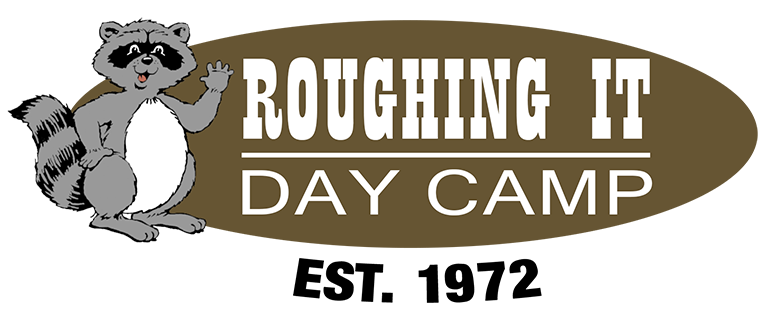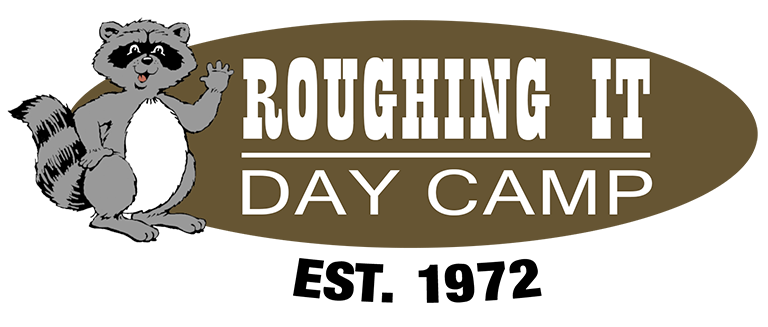More Parent Info
And Get Ready for Camp!
Camp Rules
- Be considerate of others in what you say and do.
- Cooperate with other campers and be supportive of one another.
- Follow the instructions and directions of the Staff.
- Stay with your camper group and do not wander off.
- Gum is a safety hazard and is not allowed at camp.
- Leave sticks and rocks on the ground where they belong.
- Tread lightly upon the earth – Be considerate of the environment.
- Leave your shoes on except when your counselor says you may go barefoot.
- Roughing It is tech free. Leave phones and all other electronic devices (tablets, e-book readers, smart watches) at home.
- Campers should dress to be outdoors all day. Expensive designer clothes, dangling or heavy earrings (they catch), and make-up are not needed or appropriate at camp.
- Do not bring extra items from home to show/trade. They can be easily lost.
- Firearms, dangerous weapons of any kind, illegal drugs, tobacco, alcohol are prohibited at camp and possession or use of any of the above items will result in immediate dismissal from camp.
Roughing It accepts no responsibility for the loss or damage of these items at camp. Campers will have a great time just bringing themselves.
What to Wear to Camp
Please help us make sure your camper wears appropriate clothing and shoes. Roughing It is an all-outdoors program and campers should dress so they can participate in all camp activities.
Recommended Clothing: Campers should wear well-fitted pants, sweats, or shorts, and a T-Shirt. A sweatshirt is recommended for all but the hottest days. Any sort of dress/skirts or baggy/tight clothing makes it difficult for campers to walk, run, play games, and hike the trails at the reservoir.
Recommended Swim Wear: Campers should bring a one-piece swimsuit or board shorts / rash guard on swim days. Bekinis are not allowed. Swimsuits must provide coverage, have straps and drawstring so that it will stay in place during active swimming and diving activities.
The BEST footwear is sturdy tennis or hiking shoe. This allows campers to fully participate in all of our camp activities. We recommend campers wear a sturdy shoe rather than a lighter weight (topsider or converse) shoe because they give better support and protection of the foot.
Light backpacks, not rolling packs. Rolling backpacks add extra weight and bulk and don’t travel well on dirt trails.
Label Items: Even the most careful campers misplace personal items, so please mark all items (clothing, towels, water bottles, etc) with your camper’s first name and last name initial. Use either a fine-tip permanent marker or consider purchasing a pack of stick-on clothing labels.
Camp Store: You can purchase extra Roughing It t-shirts, sweatshirts, and hats on our online store.
What to Bring to Camp
- Soft nylon backpack. Check that it fits the size of your child’s back. We don’t recommend hard packs or rolling cases as they don’t travel well over the Reservoir’s dirt trails.
- Lunch in a soft insulated lunch pack.
- Reusable water bottle. There are water stations at camp for refilling.
- Towel and one-piece swimsuit on swim days. Please see What to Wear to Camp section above for recommended swim wear. Your camper’s swim schedule will be emailed before camp starts.
- Sunscreen. We have extra sunscreen if needed. Recommended sunscreens.
- Birthday watermelon. If it’s your camper’s birthday, a Roughing It tradition is to bring a watermelon to camp.
What NOT to Bring to Camp
- Anything electronic: smartphones, iPods, video games, ipads, tablets, e-book readers, smart watches
- Watches
- Makeup or jewelry. They are not needed nor appropriate for camp.
- Earrings/piercings of any kind. Stud earrings will need to be covered with athletic tape.
- Sports, fishing, or other activity equipment/gear
- Toys, games, trading cards, or stuffed animals
- Cameras, including disposable
- Pets or any other living animal
- Candy, gum, or soda
Firearms, weapons, drugs, tobacco, alcohol, and incendiary devices like matches/lighters are strictly prohibited. Possession will result in immediate dismissal from camp.
Lunch Tips
Best practices:
- Keep food nutritious and pack enough calories for a full active day outside
- Include an extra mid-morning snack
- Use an insulated lunch pack with a frozen gel pack (or with the gel built in)
- Boxed juice can be frozen the night before to keep food cool as it defrosts.
To prevent any contamination of food, we ask parents to follow these important food safety rules:
- Avoid perishable food items (cream-based and egg products, besides hard boiled eggs)
- Pack any semi-perishable food products (meats, cheeses, mayo) next to the ice pack. During extremely hot weather we recommend against packing semi-perishable items.
- Our counselors will screen lunches and dispose of any food items that appear spoiled.
- Due to food allergies and dietary needs, there is no food sharing or trading.
Importance of Sleep
- 6 years and younger: 10-12 hours
- 7-10 years old: 9-10 hours
- 11 years and older: 8-9 hours
How We Group Campers
We group campers by age/grade, with 12 to 16 campers in each group. PreK/K groups are 12 campers. 1st through 8th grade campers are separated into boys and girls groups. PreK and K groups are coed, along with the CILT group (9th/10th grade).
All groups are supervised by an adult counselor, with younger groups assisted by a junior counselor (a junior/senior in high school).
Grouping is done at the discretion of the camp directors. One of the important life skills we teach — helping campers learn to make new friends — is facilitated by the group counselor. We have a number of activities at the start of camp and throughout the session, including GRIT Challenges, that help campers, friendly or shy, get to know each other, become close friends, and come together as a team.
Vacation
We appreciate that our camper families plan their vacations around the camp session so their camper can be a part of our camp community in a consistent manner. Taking your child out of camp for a trip affects the continuity of the camp experience. Additionally, any camper who will be absent during the first week of camp will miss important orientation and rules, and this may delay their participation in activities when they return. There is no refund for days of camp missed due to vacations.
Absences
If your camper will be absent, please call or email our office no later than 7:00 am the day of the absence. This allows us to inform the bus so they will not wait at your bus stop. If we do not have a record of their absence, we will attempt to contact you before the bus leaves your stop. If your camper will miss part of the camp day and will be picked up or dropped off at camp, please contact our office ahead of time to coordinate where and when to drop off or pick up your camper. There are no make-up days, credits, or refunds for missed days of camp due to illness, vacations, or dismissals. If running late, please see section below: Special Pick-Up & Drop-offs
Special Pick-Up & Drop-off
Families who want to arrange a time for a special pick-up & drop-off at the Lafayette Reservoir should contact the camp office. Please contact the camp office as early as possible, and no later than 8:00am of the day of the pick-up or drop-off to discuss and confirm the arrangements.
A pick-up or drop-off time will be arranged around your camper’s group schedule and may require them to miss an activity period to accommodate the change.
We ask that requests to drop off or pick up your camper are not within the times of Opening Circle: 9:00am – 9:30am & Closing Circle: 2:10 – 3:10pm.
We have safety procedures in place for parents who want to pick-up or drop-off their camper. This includes the parent parking and walking up to camp to check in or out with the camp administrator.
Please contact the camp office for more information.
Transportation
Bus Times: We email exact bus times the week before the start of the session. You can contact us earlier if you would like to get an approximate time. The bus may run slightly behind the first few mornings as the bus captain greets campers and parents for the first time and the driver gets the route down.
Authorized Release: Bus captains will only release campers to authorized adults who are on the release list. Parents are already included. You can add nannies, grandparents, and other camper families to the list by updating your authorized adult list online. Please notify us by email of any additions to this list if camp is about to or has already started, as we may have already printed the list for your bus captain.
More info about transportation and policies can be found on our Transportation Page.
Visiting Camp
All visits to camp need to be made through our camp office. Please Contact our Camp Family Coordinator if you would like to visit camp so we can set up a tour. For the safety of our community, Roughing It is not able to accommodate unaccompanied parents, family members, or guests coming into camp during the camp day. Our goal is for campers to have a positive camp experience in a safe environment.
Parent Communication
We welcome the opportunity to talk with parents and get to know our camper families better. We feel that being partners with parents is the best way to make camp the most positive experience possible.
Our unit leaders, program supervisors, and group counselors are happy to speak with you. Directors Amy, Ann, and Hobie are always available should you wish to speak to them directly.
You and your campers can get all the latest news and updates on camp by visiting Camper Caboodle. Every day we post news, pics and videos from camp. Contact us if you need to the secret code to log in.
Health & Illness
Campers must stay home from camp if they are sick or have flu/cold or COVID symptoms. If a camper gets sick at camp or starts showing signs of flu/cold or COVID symptoms, parents will need to make arrangements to pick their camper up from camp.
Please see our Health and Safety Page for more info on what to do if your child is sick.
Medication
Parents must notify Roughing It if their camper will need medication at camp. Parents must provide medication with instructions and give Roughing It written permission to administer prescription and non-prescription medication (including any aspirin, Tylenol, and cold medicine) to the camper. For Epipens, inhalers, and any medications needed for life-threatening conditions: campers will keep these in their backpacks which will be with them at all times to be used as needed under the guidance of their counselor. Roughing It requires medication instructions to be provided from both their doctor and parent before camp. All medication is kept in our secure medical box at camp and will be administered by a Camp Administrator to the camper as specified in the medication instructions.
Safety Requirements for Program Participation
In order to ensure the health and safety of everyone at camp, all campers must meet and follow Roughing it’s Safety Requirements for Program Participation. If your child has a special need, disability, impairment, or condition that requires medication or other accommodations, please inform Roughing It and request a program modification or accommodation. All accommodation requests, enrollment forms and assessments must be submitted by April 1st in order for us to adequately assess the child’s needs and any reasonable accommodations needed. Please contact us if you have questions.
Once a parent/guardian submits a modification request, Roughing It will consider that request on a case-by-case basis. Roughing It will make individualized determinations based on the specific facts of each request. Roughing It may make reasonable modifications, unless the modifications would fundamentally alter the nature of its services or unless the individual poses a direct threat to the health or safety of others that cannot be eliminated by a modification of policies, practices, or procedures.
Injury & Emergencies
When a child is injured and requires professional medical attention, parents will be notified as soon as possible. If the injury requires immediate attention we will coordinate with EMS to provide advanced care.
For minor first-aid treatment such a band-aid or cold compress, our staff will administer the first aid and contact you by the end of the day.
In the event of an emergency, Roughing It will attempt to contact parents and guardians first, followed by emergency contacts on file. Campers will only be released to parents, guardians or other authorized adults as listed on file.
Hot Weather Plan
Hot days can occur at camp and are something Roughing It prepares for. Our goal is to keep campers and staff safe, cool and having fun. When temperatures start to increase we follow our Hot Weather Plan and adjust our camp program as needed. All staff receive training in heat management strategies to keep campers safe and comfortable.
Staff & Gratuity
We work all year to find and hire the best role-modelling and nurturing staff for our campers. For details on our staff and hiring standards, visit Meet Our Staff.
Roughing It does not allow our staff to accept monetary or expensive gifts as it is unfair to other staff. To recognize a counselor’s exceptional performance, consider letting your camper make a card or other small token of his or her appreciation. We also love to hear stories from our parents on the ways our staff have made a difference in their child’s life, and staff find it very rewarding when we pass along the great feedback.
Sun & Tick Protection
Tips for New Campers
A major reason for sending your child to camp is for them to grow as an individual. Growth can come with some struggle and take time to work through. Our goal is to help your child see challenges as opportunities and not to fear the uncertainty of new situations.
When a child is confronted with a new challenge, they may say:
- “I don’t want or like to swim, hike, etc.”
- “Camp is boring, too exhausting, full of mean kids, too hot, too cold, etc.”
How, as a parent, can you respond to this?
- Acknowledge their concerns. Whether it is real or imaginary, it is real to them.
- Ask for specifics: What makes you feel that way? What happened and when and who was there?
- Brainstorm options for solving the problem. Remember not to over-rationalize with your child or get trapped in a chain of excuses.
- Provide encouragement and belief in your child to work through the challenge: “You can do this!” “I believe in you!” “We are here to help.”
- If you need additional help: Contact our camp office. We’ll work with you before your child returns to camp the next day.
What not to do:
- Writing a note saying that he/she does not have to participate in an activity. Such a note ties our hands in trying to assist your child.
- Letting your child stay home from camp.
- Offering material rewards or money to to do what they are afraid to try. This can undermine you child’s self-confidence.



